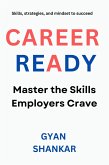Key Points to Consider:
Understanding CGPA's Role: While a high CGPA can make a strong first impression and open doors to interview opportunities, it's important to remember that it is not the sole determinant of your professional potential. Employers also value practical skills, experience, and personal attributes.
Balancing Academics and Extracurriculars: Employers appreciate well-rounded candidates. Highlighting a balance between academic achievements and involvement in extracurricular activities, internships, and volunteer work can demonstrate your ability to manage multiple responsibilities effectively.
Skill Development: Use your CGPA as a starting point to showcase the skills you have developed. Discuss how your coursework has equipped you with technical knowledge, problem-solving abilities, and critical thinking skills relevant to the job you're applying for.
Addressing Low CGPA: If your CGPA isn't as high as you'd like, be prepared to address it positively. Focus on what you learned from any challenges you faced and how you have grown from those experiences. Emphasize your strengths and any improvements over time.
Tailoring Your Approach: Different industries and companies weigh CGPA differently. Research the specific expectations of your target employers and tailor your interview strategy accordingly. Some companies may prioritize practical experience and soft skills over academic performance.
Professional Development: Highlight your commitment to ongoing learning and professional development. Mention any additional certifications, workshops, or courses you've completed to enhance your knowledge and skills in your field.
Soft Skills Matter: Communication, teamwork, leadership, and adaptability are critical skills that employers seek. Provide examples from your academic and personal experiences that demonstrate these qualities.
Practical Experience: Internships, projects, and part-time jobs can provide practical insights and experiences that are invaluable during interviews. Be prepared to discuss specific examples of how these experiences have prepared you for the role you're applying for.
By understanding the multifaceted role of CGPA in your career advancement and strategically preparing for your interviews, you can present a well-rounded profile that highlights your academic achievements, practical skills, and personal attributes.
Dieser Download kann aus rechtlichen Gründen nur mit Rechnungsadresse in A, B, CY, CZ, D, DK, EW, E, FIN, F, GR, H, IRL, I, LT, L, LR, M, NL, PL, P, R, S, SLO, SK ausgeliefert werden.









